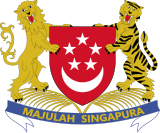 Global Information
Global InformationRepresentative democracy in Singapore information
| This article is part of a series on |
Politics of Singapore |
|---|
 |
|
Singapore has a multi-party parliamentary system of representative democracy in which the President of Singapore is the head of state and the Prime Minister of Singapore is the head of government. Executive power is vested in the President and the Cabinet. Cabinet has the general direction and control of the government and is collectively responsible to the Parliament. There are three separate branches of government: the legislature, executive and judiciary.
Representative democracy began in the 1940s when the number of elected seats in the legislature gradually increased, until a fully elected Legislative Assembly of Singapore was established in 1958. At present, Singapore legislation establishes various mechanisms that fulfil the doctrine of representative democracy. Parliamentary elections in Singapore are required to be held regularly to elect the Parliament by universal suffrage. Although the right to vote in Singapore law is not expressly mentioned in the Constitution, the Government has affirmed that the right is implied by the constitutional text.
The Constitution vests the three branches of the state with different aspects of governmental power. The executive is made up of the President and the Cabinet, which is headed by the Prime Minister. The Cabinet is accountable to the electorate and is an embodiment of representative democracy. The President is elected by the people to act as a constitutional safeguard in protecting the national reserves and preserving the integrity of the public service. To qualify as a presidential candidate, stringent criteria must be satisfied.
The Constitution further provides for the composition of a parliament which encompasses members of parliament (MPs) elected through Single Member Constituencies and Group Representation Constituencies, Non-constituency Members of Parliament (NCMPs) and Nominated Members of Parliament (NMPs). MPs are representatives of the electorate and have the role of raising concerns that the people may have. The Government's view is that representative democracy is better understood as regarding political parties rather than individual MPs as the fundamental element in the political system. While the judiciary is not a direct manifestation of the concept of representative democracy, it serves as a check on the Government and the legislature by ensuring that their powers are exercised within the limits established by the Constitution, such as the fundamental liberties in Part IV.
The democratic right of Singaporeans to change their government through free and fair elections has not been tested as of yet. From its independence, the governing People's Action Party (PAP) has won every election with varying amounts of support ranging from 60–70% of the popular vote under the first-past-the-post voting system (FPTP). Nevertheless, U.S.-based Freedom House has said that elections in Singapore are free from voter suppression and electoral fraud.[1]
The right to freedom of speech and expression, which is guaranteed to Singapore citizens by Article 14 of the Constitution of Singapore, is essential to the concept of representative democracy. Mechanisms available for the exercise of the right include the freedom of speech and debate in Parliament, Speakers' Corner, and the new media. However, Article 14 enables Parliament to restrict the right to free speech on various grounds. One of these is the protection of reputation. Critics have charged that Cabinet ministers and members of the ruling People's Action Party have used civil defamation suits against opposition politicians to inhibit their activities and exclude them from Parliament. The Government has said that there is no evidence substantiating such claims. In addition, both media ownership and content are carefully regulated by the Government. Article 14 protects the right to freedom of assembly which is relevant to free speech as the latter is often exercised at assemblies and gatherings. Free assembly is restricted in Singapore through laws that require permits to be obtained before events are held, though an exception is made for indoor events involving organisers and speakers who are citizens.
The Government has been accused of slowing down the progress of democracy by using the Internal Security Act (Cap. 143, 1985 Rev. Ed.) (ISA) to detain political opponents and suppress political criticism. In response, the Government has asserted that no person has been detained purely for their political beliefs.
- ^ "Map of Freedom in the World: Singapore (2019)". Freedom House. Retrieved 3 May 2021.